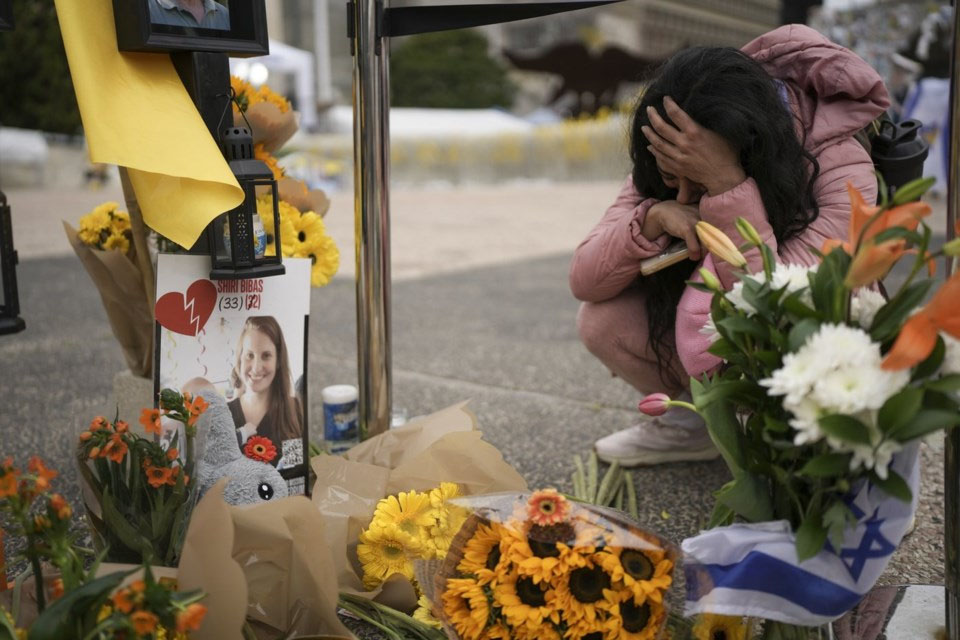JERUSALEM, Feb 22: Hamas is preparing to release six more Israeli hostages from the Gaza Strip on Saturday, although the prisoner exchange involving hundreds of Palestinian detainees is overshadowed by rising tensions between the two sides, jeopardizing the stability of the current ceasefire agreement.
As preparations were underway on Friday, Israeli Prime Minister Benjamin Netanyahu promised retaliation for what he described as “a cruel and malicious violation” of the truce, following a mistaken identification of a body that was released by Hamas.
The family of Shiri Bibas reported that Israeli forensic officials confirmed that the remains released overnight belonged to an Israeli mother of two young boys. Her remains were handed over by militants on Friday, after another set of remains delivered on Thursday was initially misidentified as hers but later identified as an unidentified Palestinian woman.
In total, three other bodies returned were verified as those of Bibas’ sons and Oded Lifshitz, who was 83 years old at the time of the abduction during the Hamas attack on October 7, 2023, which resulted in the deaths of 1,200 people in Israel and sparked the ongoing conflict.
Israel stated that its examinations concluded that the three hostages had been killed by their captors, while Hamas asserts that Lifshitz and the Bibas family members died in Israeli airstrikes on Gaza.
Hamas announced it would “conduct a thorough review” regarding the body’s identification and implied that Israeli bombings in the region where the hostages were held might have led to the mix-up of remains.
The Al-Qassam Brigades, the military wing of Hamas, confirmed that it would proceed with the release of the six Israeli hostages slated for Saturday.
The conflict over the body’s identity has raised fresh suspicions about the ceasefire deal, which has paused more than 15 months of warfare but is approaching the end of its initial phase. The negotiations for a second phase, in which Hamas would release additional hostages in exchange for a durable ceasefire and an Israeli withdrawal, are expected to be even more challenging.
The six Israeli men set to be released on Saturday are likely to be the final living hostages freed in the first phase of the ceasefire.
This group includes Eliya Cohen, 27; Omer Shem Tov, 22; and Omer Wenkert, 23, all of whom were kidnapped from a music festival during the October 7 assault. Additionally, Tal Shoham, 40, who was captured from Kibbutz Beeri, is also on the release list.
Avera Mengistu, 39, and Hisham Al-Sayed, 36, who have been detained since they entered Gaza on their own several years ago, are also expected to return to Israel as part of the arrangement.
In exchange, over 600 Palestinians imprisoned in Israel will be set free, according to the Palestinian prisoners media office on Friday. The list of prisoners includes 50 serving life sentences, 60 who are imprisoned for long terms, 47 previously released under an earlier hostage-for-prisoner swap, and 445 detained from Gaza since the war’s commencement.
Hamas has indicated it will also release four additional bodies next week, marking the completion of the first phase of the ceasefire. Should this take place, Hamas would retain about 60 hostages, with approximately half believed to be alive.
Hamas has stated it will not release the remaining captives without a lasting ceasefire and a complete Israeli withdrawal. Netanyahu, with strong support from the Trump administration, asserts his commitment to dismantling Hamas’ military and governing structures while ensuring the return of all hostages, objectives that are broadly seen as incompatible.
Trump’s proposal to relocate around 2 million Palestinians from Gaza to facilitate U.S. ownership and rebuilding efforts has further complicated the ceasefire discussions. While Netanyahu has welcomed this idea, it has faced universal rejection from Palestinians and Arab nations.
Trump remarked on Friday that he was “a little surprised” by the denials of the proposal from Egypt and Jordan, emphasizing that he would not impose it.
“I’ll tell you, the way to do it is my plan. I think that’s the concept that genuinely works. But I’m not enforcing it. I’m just going to sit back and recommend it,” Trump stated in a Fox News interview.
Israel’s military campaign has led to the deaths of over 48,000 Palestinians, predominantly women and children, according to the Gaza Health Ministry, which does not differentiate between civilians and combatants. Israel claims to have killed more than 17,000 militants, although it has not provided substantiation for these figures.
The offensive has devastated large portions of Gaza, reducing entire communities to rubble. At its peak, the conflict displaced 90% of Gaza’s population. Many who have returned to their homes are left with nothing and face challenges in rebuilding. (AP)


Leave a Reply